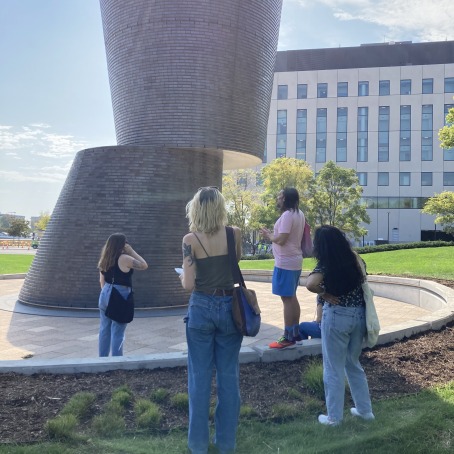Community Engaged Learning: Building Bridges Between Classrooms and Communities
In collaboration with the College’s Office of Civic Education and Innovation, many faculty members have implemented community-engaged aspects into their courses. Community-engaged learning (C-EL) classes were the vision of Wadzanai Motsi-Khatai ’12, who championed a student government initiative that ultimately led to the establishment of the Civic Education and Innovation (CEI) Office within the Center for Careers, Life, and Service (CLS). This office now plays a crucial role in supporting community-engaged teaching and learning initiatives across the curriculum. The courses are crafted to enrich classroom learning while also making a meaningful impact with and in the community.
Courses are generally planned 3–6 months ahead of time and emerge through various pathways. Sometimes, faculty collaborate with CEI staff to identify their interests and potential community partnerships. In other instances, community partners approach CEI staff to explore opportunities for classroom or co-curricular collaboration. Additionally, a partnership may begin in the classroom and develop into a sustained co-curricular service initiative. In all these scenarios, the key factor is that campus-community partnerships are intended to be mutually beneficial, creating value for both students and the community.
Marion Tricoire, assistant professor of French and studies in Africa, Middle East, and South Asia, reflects on her experience teaching FRN-295: Racism and Antiracism in Contemporary Metropolitan France, a two-credit C-EL course that ran during the fall 2020 semester. Despite the challenges of online learning, students in this class established several partnerships, the most productive of which was with the Drake Community Library in Grinnell.
In partnership with the Drake Community Library, Tricoire and students set up an online storytime that children could attend from home featuring stories read in French or both French and English. To be consistent with course content, the stories also featured Black protagonists or were created by French-speaking Black authors or artists. In the process, students got the rare opportunity to meet and communicate with French-speaking children and local Congolese immigrants. These children received hard copies of the children’s book and access to French-language programming that otherwise would rarely occur in Grinnell.
Tricoire said, “I believe that education and action are two crucial elements of anti-racism, which is why I insisted on having a C-EL component to the class.” She also writes, “The partnership with Drake Library was also a way for students to remain connected to Grinnell and the community members at a time of high disconnect globally.” Tricoire also shares her delight that many classes have maintained a partnership with the library through other types of story times.
Drake Community Library Director Karen Neal shares a similar sentiment, “The collaboration during the pandemic was important for everyone involved. Students continued their education, the library was able to continue providing programming, and the community had an opportunity for a point of connection and a unique cultural experience.”
C-EL continues to flourish, fostering meaningful connections between academic learning and community service. Assistant Professor of Political Science and Policy Studies Chair Andreas Jozwiak teaches policy studies classes in which students collaborate with local organizations to address real-world issues, honing both their academic and professional skills. This approach aligns with the College’s mission to prepare students to lead lives of purpose and positive impact in the world.
In his Applied Policy Analysis course, Jozwiak uses community partners as a student entry point to better understand affordable housing issues in the United States. Working alongside partners in Iowa City and Des Moines, students develop research projects and policy briefs that advance their partners’ missions. For example, one group partnered with Neighborhood Finance Corporation, a community development financial institution, to design programs aimed at effectively distributing Inflation Reduction Act funds to help communities adapt to climate change. They are also developing outreach strategies to engage minority communities, ensuring equitable access to these resources.
Reflecting on the value of C-EL, Jozwiak notes, “Community-engaged learning is a powerful way for students to test theory against real-world challenges. Especially for a policy class, it helps students see how policies are actually implemented, which deepens their understanding of both the complexities and the impacts of their work.”
Assistant Professor of Art History Fredo Rivera integrates C-EL into their courses to deepen students’ understanding of architectural spaces and their local contexts. In ARH 270 Modern Architecture and Globalization, students conduct visual and spatial analyses of local buildings, and, thanks to C-EL, this assignment has evolved into an immersive exploration of these sites. Collaborating with the Drake Community Library, students dive into local archival sources and engage with community members, adding layers of historical and cultural significance to their projects. To share their work, students create posters detailing their findings, which have been exhibited at Drake Library and other local venues, fostering public engagement. Rivera is also collaborating with a Vivero Fellow to develop an online architectural guide that will make these insights accessible to a wider audience.
In their ARH 272 Contemporary Architectures course, Rivera takes students to Des Moines with an assignment that examines mobilities and the built environment in Des Moines Metro. Inspired by the book Learning from Las Vegas, students visit Des Moines to research how infrastructure influences movement within the city. They meet with local leaders, explore the city archives at the Des Moines Central Library, and then conduct a focused study on a specific aspect of urban mobility and infrastructure. The students’ final reports, now housed in the Des Moines city archives, reflect both their academic research and their encounters with the city’s physical and cultural landscape.
“As a faculty member, I love working with community-engaged learning,” Rivera reflects. “They help us think more broadly and creatively about our coursework, encouraging us to connect classroom activities with the local and regional context. These adaptations enrich the liberal arts goals, as students learn to write for diverse audiences and incorporate varied sources, from oral histories to visual analyses.”
For more information about C-EL contact Susan Sanning, associate dean and executive director of Civic Education and Innovation.




